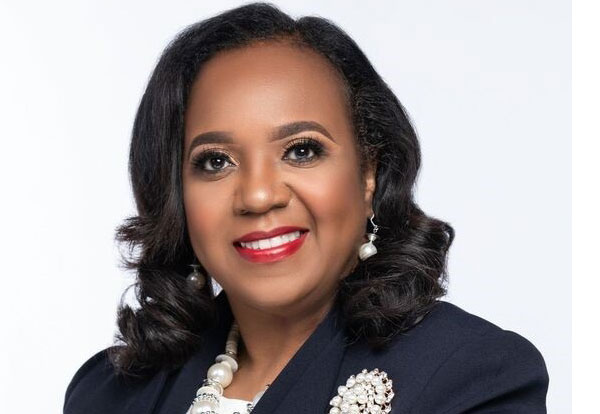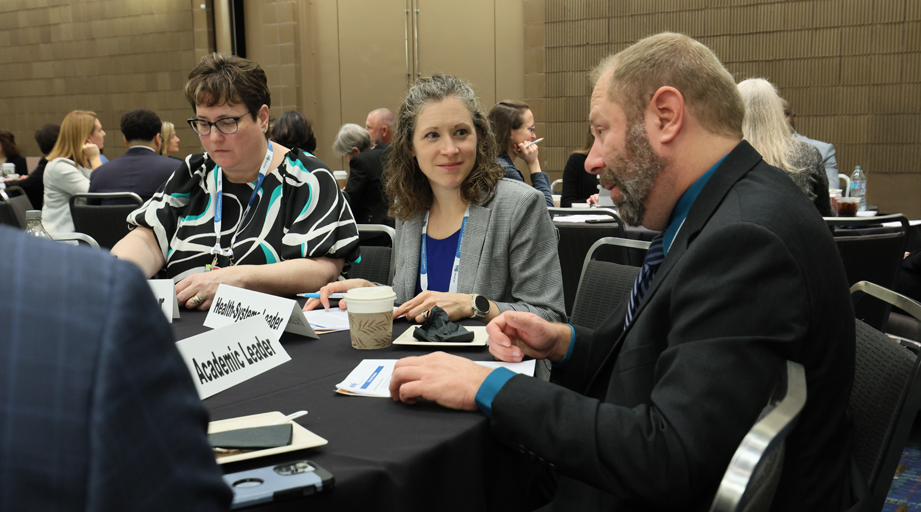
On her 60th birthday, Vivian Bradley Johnson, Pharm.D., M.B.A., FASHP, senior vice president of clinical services at Parkland Health and Hospital System in Dallas, performed the kind of selfless acts that have marked her career to date.
"I wanted essential workers to know how much I appreciated the work they've been doing during the pandemic, so I gave them certificates and gift cards, and I also prepared baskets for the homeless and the elderly," she said. "It was a full day all about others, not me."
A life of service is what brought Dr. Johnson to pharmacy in the first place. Originally from Lake City, Florida, she was inspired by several members of her community, including a couple of retail pharmacists her family entrusted with their health, and a Black community pharmacist within her church whom she admired.
Thirty-five years after starting out as a practicing pharmacist, Dr. Johnson has become an ASHP fellow with a career distinguished by numerous successful initiatives. For example, she helped launch ASHP's investigational drug service network after identifying a need for such a group.
Since taking up employment at Parkland Health and Hospital System, Dr. Johnson established the health system's first central fill pharmacy, which processes 6,000 outpatient prescriptions daily. She also developed several medication safety programs, created a variety of pharmacist-led clinical initiatives, and helped bring pharmacists to the patients' bedside.
Pharmacist Diversity
One of Dr. Johnson's greatest passions and a principle that has guided her work has been increasing diversity within the pharmacy workforce, among pharmacy leaders, and in academia. That focus on diversity recently earned her a spot on ASHP's Task Force on Racial Diversity, Equity, and Inclusion (DEI), where Dr. Johnson said she is eager to help find ways to enhance ASHP's diversity on every level, from governance to products, services, and member communication.
According to Carrie A. Berge Pharm.D., M.S., vice president of pharmacy services at Parkland Health and Hospital System, Dr. Johnson is the right person for the job, having helped ensure leadership and staff at her health system represent the community they serve.

degree at Florida A&M University, a HBCU.
"Vivian has spoken about leadership development and diversity to the entire organization throughout her career, and she has mentored many students, residents, and college interns and supports her community through extensive work with various charitable and social organizations," said Dr. Berge.
Something Dr. Johnson hopes to help ASHP do in the coming years is recruit more individuals from historically Black colleges and universities (HBCUs), a source of talent that Dr. Johnson said has been historically neglected.
"There's a bias and belief that I think some people still carry, which is that the quality of education at HBCUs is not equal to other colleges and universities. I strongly disagree with that, and we need to overcome that bias," Dr. Johnson insisted, noting that she herself completed her undergraduate pharmacy degree at Florida A&M University, a historically Black university.
While a sizeable portion of ASHP members are Black, Indigenous, and People of Color (BIPOC), Dr. Johnson said she wants to "reach out a little further to minority practitioners and students so they know how ASHP membership can benefit them."
In addition to better communicating membership benefits, Dr. Johnson would like to offer additional services, which include helping students and young practitioners find mentorship opportunities. "I didn't go from being a staff pharmacist to senior vice president of clinical services on my own," she said. "It was so important for me to have leaders and mentors to guide me."
Dr. Johnson recalled that as a new practitioner she would attend ASHP Midyear meetings with the intent of connecting and finding support from others who had been in the profession for longer. She saw this as a benefit of ASHP membership.
"I was very self-motivated and reached out to leaders in pharmacy that I looked up to, but others may not feel as comfortable approaching people, so we need to offer resources and avenues to facilitate mentorship relationships," Dr. Johnson said.
Diversity and Patient Care
Ensuring more BIPOC community members take pharmacy leadership positions will also be critical to sharing important insights into the culture and the types of challenges that diverse communities face, Dr. Johnson noted. "We need to know where there are health care disparities and how pharmacists can help eliminate those disparities," she said.
While pharmacists provide direct care for chronic diseases and medication therapy management, she said not everyone gets equal access to this care. "A better understanding of the populations that are at risk of being underserved and the social determinants that affect their access to resources will help us make sure they get the best possible pharmaceutical care," Dr. Johnson said.
Pursue Your Ambitions
Although there is much more work to do to improve diversity in the pharmacy community, Dr. Johnson hopes her own career growth can inspire BIPOC students and practitioners to strive towards their ambitions, "even when it may not appear that an opportunity is there for you."
She believes that each person should go after whatever they would like to do within the pharmacy profession. "If that means reaching out to a person you'd like as a mentor, reach out to them," Dr. Johnson explained. "For example, if you want to write an article, take the initiative and connect with someone who has published, and ask them for help. There are leaders in pharmacy who are willing to help and guide you."









